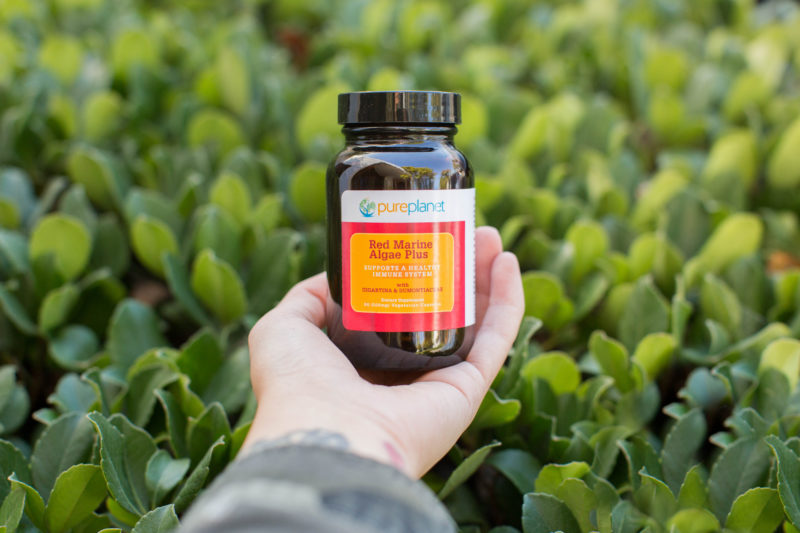Updated October 2020
We are OBSESSED with sea vegetables like algae because they are so underrated. The blue-green variety (also known as spirulina) is one our faves, because it’s basically one of Mother Nature’s least-talked about multi-vitamins. It baffles us that these marine plants don’t get as much love as they deserve.
They are available in different varieties, mostly defined by color – including yellow, brown, green, blue-green, yellow green and one of our all-time favorites, red.
Funnily enough, this color strain is probably the most under-appreciated and least known of all… but not for long. We think it will be on the up and up very soon. Now’s your chance to get ahead of the curve.
Why? Well, because it can make a great addition to any wellness regimen, for those who are serious about their health and even for casual vitamin-users.
Here are 4 reasons why you should be interested in this marine plant.
It boasts amazing antioxidant benefits.
Like other algae strains, this plant contains antioxidant properties. Antioxidants help the body manage free radical damage to cells. This simple act helps encourage overall body health.
One field review published in Plant Signaling & Behavior suggests that sea algae antioxidants could be even better than those from land-based greens:
Microalgae represent an almost untapped resource of natural antioxidants, due to their enormous biodiversity, much more diverse than higher plants. However, not all groups of microalgae can be used as natural sources of antioxidants, due to their widely varied contents of target products, growth rate or yields, ease of cultivation, and/or other factors.
Shalaby, Emad A. “Algae as Promising Organisms for Environment and Health.” Plant Signaling & Behavior 6.9 (2011): 1338–1350. PMC.
These antioxidants can also help support eye and skin health with minerals such as:
- Folate
- Calcium
- Magnesium
- Zinc
- Iron
- Selenium
It can help support the body’s response to inflammation.
Algae naturally contains not only anti-inflammatory antioxidants, but also minerals and phytonutrients. A study published in Marine Drugs explored this effect in depth.
The researchers explain that specifically high chlorophyll and omemga-3 fatty acid content support the body’s natural process of relieving pain and inflammation. This works by helping the body manage oxidative stress.
Managing this stress also helps prevent chronic disease!
Red marine algae contains a special kind of polysaccharide, which may help support immune health.
Trust us, it’s really special. All algae are rich in polysaccharides, but only the red strain contains carrageenan. This phytochemical helps support the immune system against viruses and infections.
Gigartina, a red algae species, has actually been associated with possibly treating candida and other infections. One study published in Mycopathologia suggests that extracts may be able to effectively inhibit fungal growth. More research is needed to confirm this correlation.
The same theory has been applied to the treatment of human papillomavirus (HPV). More study is needed to help help warrant these claims though.
Important Note
Some of you may have heard of carrageenan before in a different light. We like to keep things pure + true, so here’s a little background:
This chemical is sometimes extracted from red algae and injected into store-bought milk products. This is because it can act as a thickening agent, adding much-needed consistency to these types of products.
Carrageenan is good right? So, what’s the issue?
Well, it may be good coming from a whole food seaweed source, but simply using the extract as an additive is problematic.
Why?
Alone, it holds no nutritional value – it isn’t even digestible. Due to this, the additive may damage your gut. Some nutritionists suggest steering clear of it.
But you don’t have to worry about it in seaweed, because it is naturally occurring. No studies have linked the whole food source with the same issues.
Okay, back to some light-hearted goodness! On to our last favorite thing about Red Marine Algae…
You can easily add it to your diet.
What’s the fourth reason for you two give red algae a try? What about it’s ease of use?
Lots of people get a little cautious about how they are going to consume seaweed. So let’s just answer the question you might be thinking of:
No, you do not eat it directly out the ocean! Those sources are potentially dangerous, carrying with them bacteria and disease. Don’t touch them.
Lucky for you, seaweed is growing in popularity. They are available in snack chip form and can even be integrated into salad garnishes.
See It in Action
Red algae is a little harder to find. But don’t worry, we have you covered. Want to give it a try? Check out our Red Marine Algae Plus (with spirulina), which can help support the immune system.
Shop now PurePlanet.com.
More Sources and Info
https://www.water-for-health.co.uk/our-blog/2017/03/can-red-marine-algae-really-help-boost-immune-system/
https://www.livestrong.com/article/183640-red-marine-algae-health-benefits/
https://www.ncbi.nlm.nih.gov/pubmed/22054963



